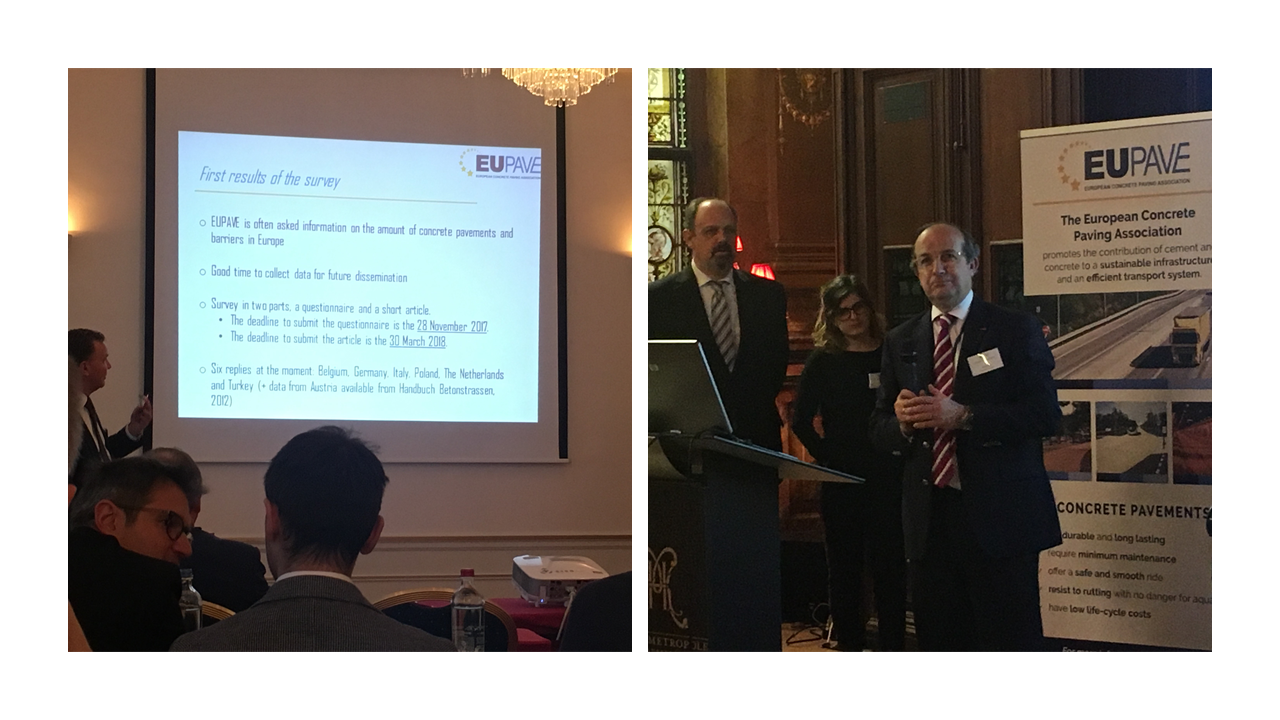On Monday, 11th December EUPAVE organised an internal workshop entitled “Successes and failures in promotion of concrete paving- learning from others”. During this event, which was held at Metropole Hotel (in the heart of Brussels), several case studies in promotion of concrete in transport were discussed.
Mr. André Burger, Vice-President of EUPAVE, welcomed the attendees and thanked them for their presence on the celebration of EUPAVE’s first ten years. Then, he indicated that they were there to discuss the current situation of concrete pavements in Europe and analyse the existing market barriers. The key question here is: “why is not concrete the preferred material in some Member States?” Because of this, EUPAVE is conducting a consultation among its members from which it is intended to draw future conclusions.
Mr. Luc Rens, Managing Director of EUPAVE, spoke about the majority presence in Belgium of bicycle paths built with concrete (58%). In this sense, the contractors have the necessary equipment and experience. However, external pressures to the Flemish government have resulted in the following declaration: “asphalt should be the first choice for cycle paths (…) other materials such as concrete are possible in particular conditions. For instance, the presence of heavy traffic crossings”. This means a direct threat to the market of concrete pavements for cycle paths.
Jan Deja from the Polish Cement Association (SPC), recounted the Polish experience on the promotion of concrete roads, which formally began in the mid-nineties with the Polish motorway programme. He also noted that in Poland about 650 km of motorways and 800 km of local roads are built with concrete.
EUPAVE’s 10th-year anniversary event was also held at the Metropole Hotel: a dinner attended by the EUPAVE family and personalities such as Daniel Calleja, General-Director of the European Commission’s Directorate General for the Environment (DG ENVI).
Mr. Stéphane Nicoud, President of EUPAVE, opened the event thanking all the attendees for their presence and remarking on the intense activity that EUPAVE had carried out in the European arena for ten years. Subsequently, he addressed the European Commission to request that the target by which it aims to reuse 70% of the waste generated by construction and demolition (CDW) can actually be achieved by 2020. It is worrisome to know that the percentages vary by 25-90% among the Member States since technology for the separation and recovery of construction and demolition waste is well established, readily accessible and in general inexpensive. Likewise, concrete makes up a large portion of this waste (50%) and despite what many people often think, is 100% recyclable.
Mr. André Burger, Vice-President of EUPAVE, intervened to tell the story of EUPAVE and pointed out that at present the Association is composed of 22 members and 16 partners from 15 different countries. Throughout these ten years, EUPAVE has brought to light several position papers, has held several events in Brussels and has collaborated with a considerable number of national associations.
Mr. Daniel Calleja, General-Director of DG ENVI, referring to sustainable construction, indicated that sustainability is the key word that should serve as a guide to achieve a zero-waste society. In addition, competitiveness and sustainability are no longer incompatible, since following the precepts of the circular economy means obtaining not only environmental and social benefits, but also economic ones – the most sustainable companies are obtaining greater annual profits. For its part, the European Commission supports sustainability in construction through green public procurement – since it is necessary to integrate it into business models – and tools such as the European Fund for Strategic Investments (EFSI), that supports investments in infrastructure projects.
Mr. Claude Van Rooten, President of the World Road Association (PIARC), spoke about the future challenges of the road and pointed out as a key issue the use of recycled aggregates in the new concrete pavements.
Subsequently, several short interventions by representatives of various associations were connected: the Conference of European Directors of Roads (CEDR), the European Union Road Federation (ERF), the Forum of European National Highway Research Laboratories (FEHRL), the American Concrete Paving Association (ACPA) and the International Society for Concrete Pavements (ISCP). All of them highlighted the 10 years of fruitful cooperation with EUPAVE.
Finally, EUPAVE’s President concluded pointing out that EUPAVE, despite some obstacles -as the beginning of the economic crisis- have undoubtedly managed to represent and defend the concrete pavement’s sector in a very respectable way. During its first decade, EUPAVE was able to do more with less but which is sure is that will do even more and better in the forthcoming 10 years.



No Comments